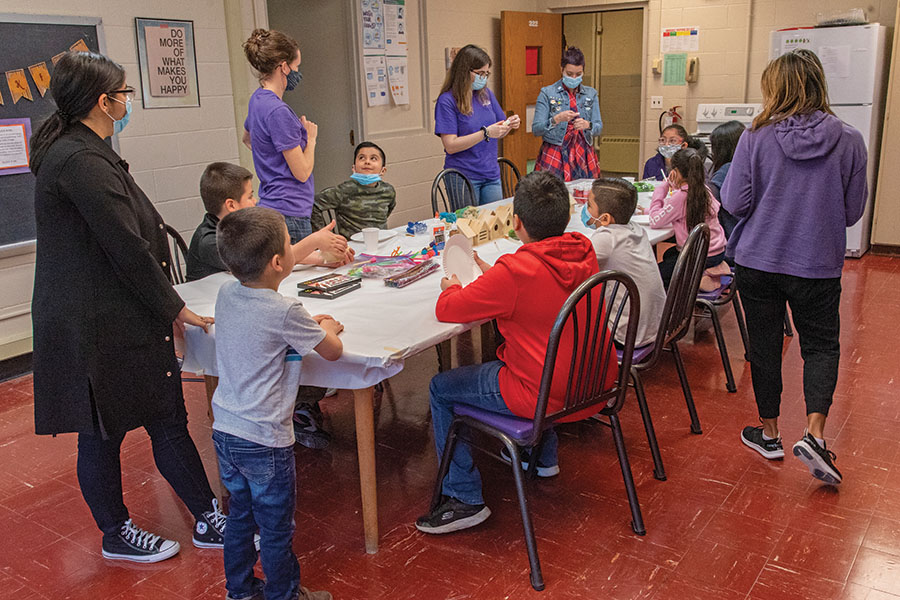FEATURE
Caring for – and Partnering with – Our Neighbors
Multidisciplinary projects engage students, faculty, and community.
by Erich Van Dussen

Left to right, standing: Nancy Garcia ‘21, ‘23G (speech-language pathology); Professor Tania Giorgis (communication sciences & disorders); Mackayla Thompson ’20, ‘22G (social work); Danielle Legg ‘24G (social work); and Ambika Elliott ‘23 (nursing) guide students in a birdhouse painting activity intended to build social-emotional skills.
Pockets of immigrant and migrant families live and work in rural farm communities less than an hour’s drive from the Nazareth campus. Through a multiyear program, Nazareth faculty and students are engaging with those families to support a variety of social, emotional, and cultural needs — one birdhouse, one photo album, and one Sunday afternoon at a time.
The program, El Cuidado de Nuestros Vecinos, or Caring for Our Neighbors, is funded by a nearly $600,000 grant from the Mother Cabrini Health Foundation. Nazareth collaborates with community partners to form connections with parents and children in small towns in Wayne and Livingston counties, through wide-ranging efforts including English-language tutoring, a summer day camp, and literacy and wellness lessons in a migrant summer school.
Families derive distinct benefits from this work. So do Nazareth students, who are sharpening their clinical and professional skills in out-of-the-classroom settings while developing a stronger appreciation for the diverse world in which they live.
One Sunday afternoon at a middle school in Sodus, Wayne County, parents in the program are continuing a creative task: assembling loose-leaf family albums with personal photos, an illustrated family tree, and affirming messages shared between the parents and their children.
Because immigrant children may pick up English-language skills more quickly than their parents, projects like this help maintain family connections that can be affected by differences of acculturation. Parents then have a group read-aloud from a bilingual children’s book, a Mexican folktale titled Telma, the Little Ant, that the parents will take home to share with their kids.
Meanwhile, the children are down the hall, intently focused on painting miniature birdhouses — a social-emotional activity devised by graduate students and faculty.
These projects require creativity, flexibility, and a commitment to collaboration, says Tania Giorgis, a professor in Nazareth’s Communication Sciences and Disorders Department. Giorgis and Leanne Charlesworth, chair of the Social Work Department, are among the multidisciplinary faculty coordinators of El Cuidado de Nuestros Vecinos.
“There’s a lot of relationship-building and trust-building involved — with the families, and with each other,” Giorgis says. “We’ve found that it’s helpful to have the students share and reflect on the personal and professional skills that they bring, and their observations across sites. These interactions set the stage for building cultural humility and interprofessionalism.”
Nancy Garcia ‘21, ‘23G (speech-language pathology), finds that her skills lend themselves to a focus on phonemic awareness and literacy activities with the families. “It’s nice seeing how we can all work together to serve a community differently,” she says of herself and her fellow students in the program.
Their collective impact is felt deeply by participants. Beatriz Aguilera is attending with her sons, 11-year-old Adrian and 4-year-old Emanuel. In Spanish, she says that working six days a week on a farm leaves little time for family connections. “This is a good time to have with my sons. I can also relax when I can talk to other parents. And the kids can have fun, too — not just me.”
Beatriz's sister Maria Aguilera agrees. “By reading, I remember a lot of things about my childhood. I can share those memories when I talk with other parents. It’s wonderful.”
Garcia, whose parents emigrated from Mexico 23 years ago, feels a strong affinity for many of the participants in El Cuidado de Nuestros Vecinos. “I liked being a Latinx professional who the students could relate to and who speaks their language,” she says. Above and beyond honing her skills, she notes, “I really appreciated the connection I made with the community itself.”
Freelance writer Erich Van Dussen lives in Rochester, New York.